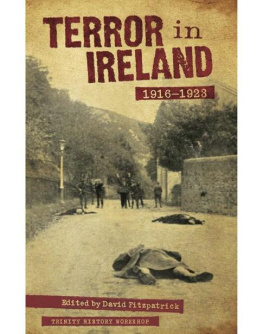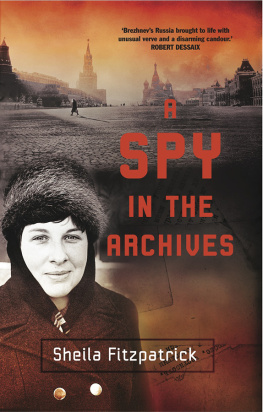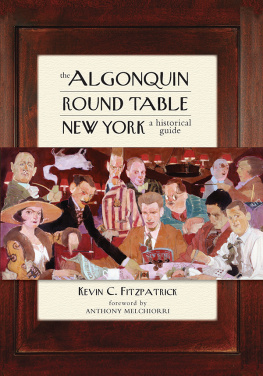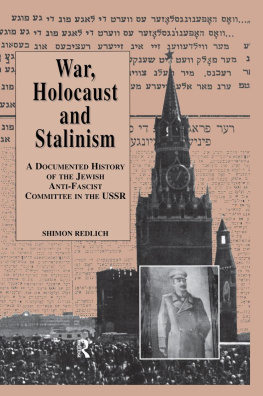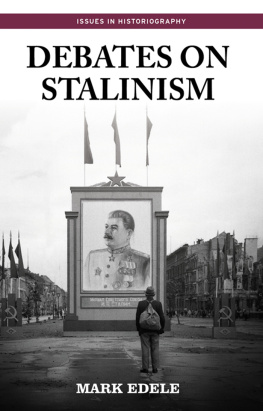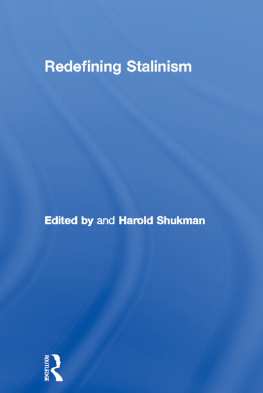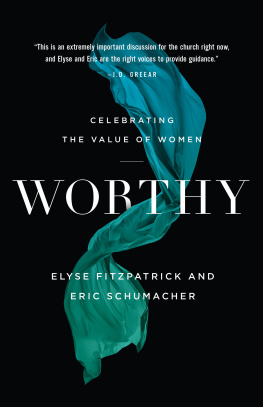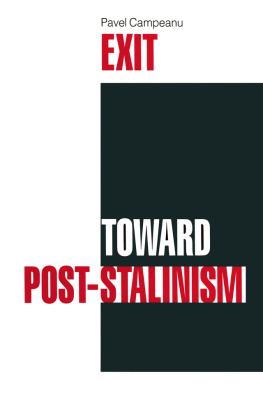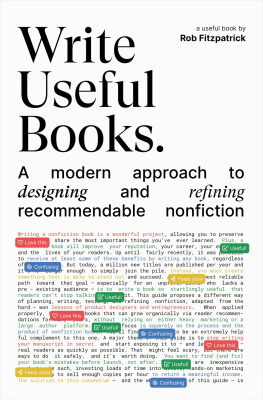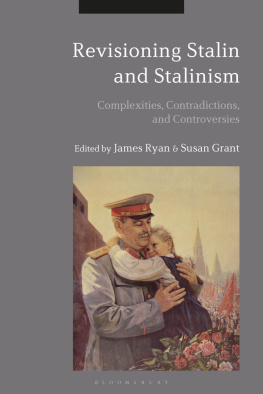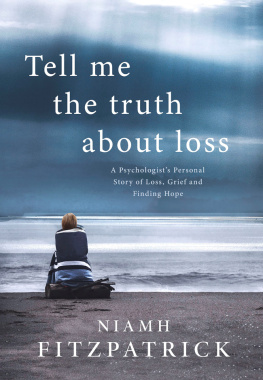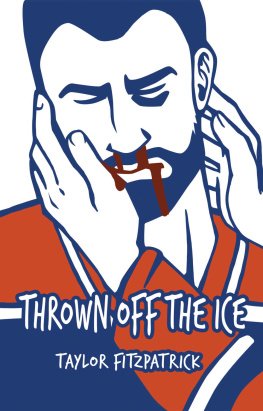Fitzpatrick - Everyday Stalinism
Here you can read online Fitzpatrick - Everyday Stalinism full text of the book (entire story) in english for free. Download pdf and epub, get meaning, cover and reviews about this ebook. year: 1999, publisher: Oxford University Press, genre: Politics. Description of the work, (preface) as well as reviews are available. Best literature library LitArk.com created for fans of good reading and offers a wide selection of genres:
Romance novel
Science fiction
Adventure
Detective
Science
History
Home and family
Prose
Art
Politics
Computer
Non-fiction
Religion
Business
Children
Humor
Choose a favorite category and find really read worthwhile books. Enjoy immersion in the world of imagination, feel the emotions of the characters or learn something new for yourself, make an fascinating discovery.

- Book:Everyday Stalinism
- Author:
- Publisher:Oxford University Press
- Genre:
- Year:1999
- Rating:3 / 5
- Favourites:Add to favourites
- Your mark:
- 60
- 1
- 2
- 3
- 4
- 5
Everyday Stalinism: summary, description and annotation
We offer to read an annotation, description, summary or preface (depends on what the author of the book "Everyday Stalinism" wrote himself). If you haven't found the necessary information about the book — write in the comments, we will try to find it.
Everyday Stalinism — read online for free the complete book (whole text) full work
Below is the text of the book, divided by pages. System saving the place of the last page read, allows you to conveniently read the book "Everyday Stalinism" online for free, without having to search again every time where you left off. Put a bookmark, and you can go to the page where you finished reading at any time.
Font size:
Interval:
Bookmark:
Everyday Stalinism
Ordinary Life in Extraordinary Times: Soviet Russia in the 1930s
Sheila Fitzpatrick


Oxford New York
Athens Auckland Bangkok Bogot
Buenos Aires Calcutta Cape Town Dar es Salaam
Delhi Florence Hong Kong Istanbul Karachi
Kuala Lumpur Madras Madrid Melbourne
Mexico City Mumbai Nairobi Paris Singapore
Taipei Tokyo Toronto Warsaw
and associated companies in
Berlin Ibadan
Copyright 1999 by Oxford University Press, Inc.
First published by Oxford University Press, Inc., 1999
198 Madison Avenue, New York, New York 10016
First issued as an Oxford University Press Paperback, 2000
Oxford is a registered trademark of Oxford University Press
All rights reserved. No part of this publication may be reproduced,
stored in a retrieval system, or transmitted, in any form or by any means
electronic, mechanical, photocopying, recording, or otherwise,
without prior permission of Oxford University Press.
Library of Congress Cataloging-in-Publication Data
Fitzpatrick, Sheila
Everyday Stalinism: ordinary life in extraordinary times.
Soviet Russia in the 1930s / Sheila Fitzpatrick.
p. cm. Includes bibliographical references
and index.
ISBN 0195050002 (Cloth)
ISBN 019505001-0 (Pbk.)
1. Soviet UnionSocial conditions.
2. Soviet UnionHistory19251953.
3. City and town lifeSoviet Union.
4. CommunismSoviet Union.
I. Title.
HN523.F57 1999 306.0947dc21 9815421
1 3 5 7 9 1 0 8 6 4 2
Printed in the United States of America
To My Students
This book has been a long time in the makingalmost twenty years, if one goes back to its first incarnation; ten years in its present form. Over that period, I acquired intellectual debts to so many people that I cannot list them all. Those whom I acknowledge here made a direct contribution in the final stages of the project.
Jrg Baberowski, Dietrich Beyrau, Terry Martin, and Yuri Slezkine were kind enough to read the whole manuscript and make detailed comments that were extremely helpful. To Yuri I owe an additional debt for answering all my e-mails about Russian linguistic usage and esoteric aspects of Soviet culture. In the sphere of politics and police matters, J. Arch Getty generously played a similar role. James Andrews, Stephen Bittner, Jonathan Bone, and Joshua Sanborn aided me as research assistants at various times. Michael Danos read the whole manuscript in all its drafts and made useful editorial suggestions as well as helping to shape my thinking about the topic. Thanks are also due to two fine editors at Oxford University Press: Nancy Lane, an old friend, without whose tireless prodding and cajoling over many years the book might never have been written, and Thomas LeBien, whose support and good advice made the final stages of the project easier.
It is a particular pleasure to acknowledge my debt to a remarkable cohort of students at the University of Chicago who wrote or are writing Ph.D. dissertations dealing with aspects of the 1930s: Golfo Alexopoulos, Jonathan Bone, Michael David, James Harris, Julie Hessler, Matthew Lenoe, Terry Martin, John McCannon, Matthew Payne, and Kiril Tomoff. I have learnt a great deal from their work and from working with them; and it is in recognition of this exceptionally stimulating and happy collaboration that I dedicate this book to past and present students. I have also benefited from working with other current and former members of the Chicago Russian Studies Workshop, notably Stephen Bittner, Christopher Burton, Julie Gilmour, Nicholas Glossop, Charles Hachten, Steven Harris, Jane Ormrod, Emily Pyle, Steven Richmond, and Joshua Sanborn, as well as my much-valued colleagues, Richard Hellie and Ronald Suny.
Other young scholars whose recent work on the 1930s has been particularly useful to me include Sarah Davies, Jochen Hellbeck, Oleg Khlevniuk, Stephen Kotkin, and Vadim Volkov.
I thank the John Simon Guggenheim Foundation, the John D. and Catherine T. MacArthur Foundation, IREX, the National Council for Soviet and East European Research, and the University of Texas at Austin for support at various stages of the project. Equally heartfelt gratitude goes to the University of Chicago for providing the best of all possible environments for scholarship.
To make it easier for the reader, I have used familiar anglicizations of names of well-known figures like Trotsky, Tukhachevsky, Lunacharsky, Gorky, Vyshinsky, Zinoviev, Mikoyan, and Tolstoy. Given names like Natalia, Maria, and Evgenia are rendered without the extra i that a strict transliteration requires. For other names I have followed the standard transliteration model set by the Library of Congress, except that in the text I have not used diacritical marks for proper names and place names.
Since this is a social history, I saw no reason to burden the reader with a proliferation of undecipherable institutional names and acronyms in the text. Where necessary, elucidation about institutional provenance is given in the footnotes. I have referred throughout to Ministries and Ministers in place of the Peoples Commissariats and Peoples Commissars that are strictly correct for this period. In my text, province or region stands for the Russian oblast and krai, and district for raion.
Everyday Stalinism
This book is about the everyday life of ordinary people, little men as opposed to the great. But the life these ordinary people lived was not, in their own understanding and probably ours, a normal life. For those who live in extraordinary times, normal life becomes a luxury. The upheavals and hardships of the 1930s disrupted normalcy, making it something Soviet citizens strove for but generally failed to achieve. This book is an exploration of the everyday and the extraordinary in Stalins Russia and how they interacted. It describes the ways in which Soviet citizens tried to live ordinary lives in the extraordinary circumstances of Stalinism. It presents a portrait of an emerging social species, Homo Sovieticus, for which Stalinism was the native habitat.
There are many theories about how to write the history of everyday life. Some understand the everyday to mean primarily the sphere of private life, embracing questions of family, home, upbringing of children, leisure, friendship, and sociability. Others look primarily at worklife and the behaviors and attitudes generated at the workplace. Scholars of everyday life under totalitarian But the book was not written to illustrate any general theory of the everyday. Its subject is extraordinary everydayness.
The times were extraordinary because of the revolution of 1917 and the upheavals, no less deracinating and disruptive, that accompanied the regimes turn to rapid industrialization and collectivization of agriculture at the end of the 1920s. These were times of massive social dislocation, when millions of people changed their occupations and places of residence. Old hierarchies were overturned, old values and habits discredited. The new values, including condemnation of religion as superstition, were puzzling and unacceptable to most of the older generation, although the young often embraced them with fervor. It was declared to be a heroic age of struggle to destroy the old world and create a new world and a new man. The regime, committed to social, cultural, and economic transformation, rammed through radical changes regardless of the human cost, and despised those who wanted to rest from the revolutionary struggle. Savage punishments, worse than anything known under the old regime, were inflicted on enemies and sometimes randomly on the population. Large numbers of people found themselves stigmatized as social aliens in the new society.
Next pageFont size:
Interval:
Bookmark:
Similar books «Everyday Stalinism»
Look at similar books to Everyday Stalinism. We have selected literature similar in name and meaning in the hope of providing readers with more options to find new, interesting, not yet read works.
Discussion, reviews of the book Everyday Stalinism and just readers' own opinions. Leave your comments, write what you think about the work, its meaning or the main characters. Specify what exactly you liked and what you didn't like, and why you think so.

